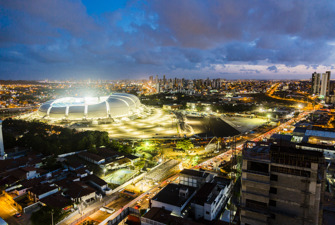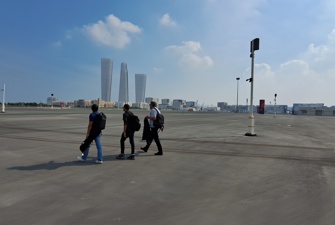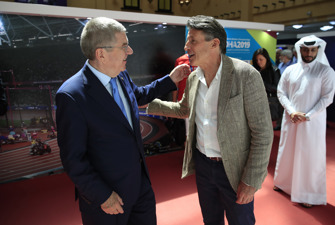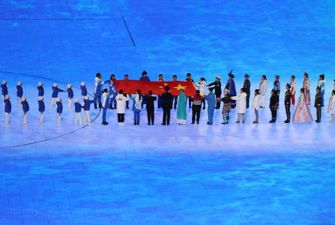China vs. Taiwan: The battle for global influence through stadium diplomacy
China's global stadium-building spree has spanned more than 70 countries since the 1950s, reaching Africa, the Caribbean, and the Pacific region. China funds and constructs these arenas in a battle with Taiwan over diplomatic recognition, and most recently Saudi Arabia has also become involved in the endeavour.
Since the late 1950s, funding from the People’s Republic of China (PRC) has supported nearly 150 stadium construction projects around the world new research from Play the Game reveals.
The financial assistance, which in many cases has come with practical assistance from Chinese engineers, has been provided to 70 countries and enabled them to stage major regional sports events. Examples include multiple stadia for football's Africa Cup of Nations (AFCON) and events such as the 2007 Cricket World Cup in the Caribbean and the Indian Ocean, Micronesian, Pacific and South East Asian Games.
It has also supported a political drive by the PRC to persuade nations to abandon relations with Taiwan and recognise the PRC as the sole legitimate government of China.
Table 1: Stadium construction projects around the world since the late 1950s
| Region | Projects | Number of countries |
| Africa | 107 | 43 |
| Asia | 15 | 8 |
| Pacific | 12 | 8 |
| Caribbean | 10 | 7 |
| Latin America | 3 | 3 |
| Europe | 2 | 1 |
| TOTAL | 149 | 70 |
Source: Play the Game/AidData
Official news agency Xinhua says that 45 stadia were built in Africa between 2000 and 2020 but quantifying the extent of China’s stadia-building programme is problematic. Play the Game’s research, which has been supported by cross-referencing with the digital AidData research lab at William & Mary University in the USA, suggests three times that number of projects have been supported since the late 1950s when China helped fund stadia projects in Mongolia and Syria.
Figure 1: Number of stadia built since 1957
Table of stadiums built from 1957 to 2017. Source: Play the Game / AidData * Estimated
Since then, stadia funded and frequently built and maintained by China have been used at four out of the last five AFCONs, and also many smaller regional sports events. Madagascar’s hosting of the 2007 Indian Ocean Games, for example, was supported by a grant for sporting materials and the rehabilitation of stadium track according to AidData.
The Pacific Games has benefitted from a swathe of Chinese funding as stadia used by the competition’s last three hosts, the Solomon Islands (2023), Samoa (2019) and Papua New Guinea (2015), all were supported by China. China has also provided funding to the Cook Island and Vanuatu to stage the Pacific Mini Games in 2009 and 2017 respectively.
Chinese funding extends to training, equipment, and awards
Grants, subsidies and loans are not solely for stadia but also support other facilities for major sporting events, such as 21.4 million US dollars for a village accommodation project in the Solomon Islands to host the 2023 Pacific Games Village, which was supported by China along with 53 million US dollars for a new stadium in Honiara.
China’s assistance for sport in the developing world also extends beyond constructing facilities. According to AidData’s research, in 2021 alone, China funded training for Cambodia’s women’s football team, table tennis tables for the Caribbean Island of Dominica, an outdoor volleyball court in Malawi, martial arts kits for Romania and what is described as ‘soccer supplies’ to Fiji’s army football club.
In 2013-14, the state-owned company China Harbour Engineering even donated 260,000 US dollars to the top flight of Jamaican football and separately also provided 23,000 US dollars on players awards, according to AidData.
A vehicle to enhance bilateral relations
The support for stadia and sports facilities is the largest component of China’s Belt & Road Initiative, which is supporting colossal infrastructure investments around the globe.
Dr Jonathan Sullivan, associate professor and PGR Director at the University of Nottingham’s School of Politics and International Relations, says: “China wants to expand and deepen its engagement with countries everywhere, and in the developing world it can do that effectively through aid and loans, which often takes the form of infrastructure."
“China has huge capacity and expertise in all kinds of engineering and construction operations, and it also likes to provide tangible aid – antimalaria or clean water programmes might be more useful, but a stadium or a bridge makes more of a mark."
"Local elite partners also like sports infrastructure, so they can have the glory of putting on sports events. Sports infrastructure is an expedient vehicle to enhance China’s bilateral relations, ultimately to facilitate access to resources, markets or whatever,” explains Dr. Sullivan.
Aid in excess of 5 billion US dollars
Quantifying how much China spends and has spent on sports facilities is difficult. Not only is it hard to identify projects as benefitting from Chinese support, but it is also difficult to come by confirmed financial figures.
Play the Game’s research identified financial figures for 93 of the 149 stadia projects, although confirming whether this figure was a grant or loan and whether this is the full cost is not always easy. However, the total figure for these projects is in excess of 5 billion US dollars.
Many of the stadia funding deals are tied to agreements for natural resources in the recipient country, but these arrangements have been criticised in places such as the Democratic Republic of Congo for not delivering on economic pledges made at the time.
Some stadia are built using Chinese loans, but others have reportedly been gifted by China, such as a 150 million US dollar stadium in Cambodia built to host the 32nd Southeast Asian Games in 2023.
The Morodok Techo Sports Complex in Cambodia was reportedly gifted by China. Photo: Ouyang Kaiyu / China News Service / Getty Images
China has exited some projects and reportedly withdrew funding for a grant of 113 million US dollars to build two stadia at Uhinga and Akii-Bua in Uganda. They were scheduled to begin in 2018 but had not begun by 2021 due to the Covid-19 pandemic.
In some countries, stadia built and funded by China are no longer in use for sport. The George Odlum Stadium in St Lucia – built to host the 2007 Cricket World Cup for 20 million US dollars – has been in use as a hospital after a fire in 2009 destroyed portions of St Jude Hospital in nearby Vieux Fort.
Many stadia need repairs which China also fund
In some cases, China has funded or constructed stadia and then returned later with aid to bring the ground back to a useable state. This has led to criticism of building costs and the standard of the original work carried out, particular in Africa.
Politicians in Liberia claimed that 18 million US dollars spent on refurbishing the existing Samual Kanyon Doe Stadium three years ago would have been better spent on an completely new ground. Similar concerns have been raised in the Gambia.
Research for this article has found stadia built and then refurbished by China years in Barbados, Benin, Cameroon, Central African Republic, Liberia, Mauritania, Nepal, Senegal and Sierra Leone, but problems continue with a swathe of African countries still unable to play at home.
Two years ago a clampdown by FIFA on unfit stadia left more than 30 grounds in Africa unable to host internationals and forced many countries to play abroad according to an earlier Play the Game investigation. Issues continue and in June 2024, Congo Brazzaville had to forfeit their World Cup qualifier at home to Niger due to ongoing renovation work to the Alphonse Massamba Débat stadium in Brazzaville, which was built in 2002 by China.
Building continues to help hosts of major events
Despite these concerns, China continues to fund stadia projects that will enable developing countries to stage major events. Earlier this year, Chinese contractors won the contracts to build two major new arenas in Kenya and neighbouring Tanzania, which will jointly host the 2027 AFCON.
Elsewhere, the National Hockey Centre and Damodar City Aquatic Centre in Fiji have been refurbished with Chinese support to help the island host the 2031 Pacific Games.
Another even smaller Pacific island, Tonga, was due to host the event in 2019 but withdrew two years before amid concerns over the economic impact and level of facilities. These concerns have, however, been eased after work began in January 2023 on a 60 million US dollars sports complex – funded by China.
In January, China offered a package of aid and debt repayments reportedly valued at 137 million US dollars for Nauru, which is due to host the 2026 Micronesian Games, after the tiny Pacific island’s government agreed to sever ties with Taiwan.
Countries can only recognise China or Taiwan and Nauru’s government had previously switched to Beijing in 2002 then back again three years later.
The battleground in the Pacific
The Pacific is becoming an increasingly important political battleground between China and Taiwan, and countries are being wooed by financial aid that often includes support for sports events but are sometimes playing both sides off against each other.
In 2002, construction began in Kiribati on the Betia Sports Complex, which includes indoor and outdoor basketball courts, a gymnasium and 1,000-seat football ground, helped by a grant of 5.5 million US dollars grant from China. When Kiribati cut diplomatic ties with China after switching to Taiwan in 2003, work was suspended, and this project was only completed in 2006 with Taiwanese help.
In September 2019, Kiribati then cut ties with Taiwan – the seventh country to do so in the past three years and just days after the Solomon Islands did the same. China subsequently provided $250,000 in cash to support Kiribati’s annual Te Runga National Championship Games (football) according to AidData’s research.
With Kiribati and now Nauru switching sides, just a dozen countries recognise Taiwan: Belize, Guatemala, Haiti, Holy See, Marshall Islands, Palau, Paraguay, St Lucia, St Kitts and Nevis, St Vincent and the Grenadines, Eswatini and Tuvalu.
Taiwan is funding some sports projects in the rump of countries that are holding out against China, in particular in the Pacific. A track and field stadium and gymnasium were completed in Majuro, the capital of the Marshall Islands, earlier in 2024, ahead of the 2024 Micronesia Games.
Taiwan has supported the construction of a new gymnasium and a refurbishment of the national stadium in Koror, the capital of Palau. Photo: Steve Menary
Taiwan has also supported the construction of a new gymnasium and a refurbishment of the national stadium in Koror, the capital of Palau, which will host the 2025 Pacific Mini Games.
John Hennessy-Niland, the US ambassador to Palau from 2020-2023, says: “In these small Pacific islands with weak infrastructure there is a big competition between the PRC and Taiwan. It’s hard for governments to visibly take help with facilities from Taiwan [if they have relations with China]. This is to the detriment of sport, the people and public health.”
In 1998, Taiwan agreed to fund a stadium project in Grenada to host matches in the 2007 World Cup but two years before this competition, the Caribbean Island cut ties to recognise China. Other countries to drop Taiwan in favour of China for economic benefits including a new stadium were Costa Rica in 2011 and El Salvador seven years later.
Dr Sullivan adds:
“Taiwan does what it can to encourage its remaining formal allies to stay the course, and that involves generous support for those countries. The PRC occasionally makes overtures to Taiwan’s allies and when diplomatic switches occur it usually comes out that the PRC has made a big investment or aid pledge. If China really wanted to claim all of Taiwan’s allies, it has the resources to make it happen. But it is more convenient to pluck them off for maximum effect to damage Taiwan’s government."
“Taiwan is relatively well off, but it does not have the resources that China has, and it is a democracy where people are very hot on government accountability. Thus, there is no way that Taiwan can compete when it comes to throwing money or other resources around."
"If Xi Jinping decide to send a few billion to Chad for a winter sports facility no one in China would blink an eye – that is not the case in Taiwan, very far from it. What Taiwan can do with its partners is to conduct itself in a manner that is appropriate and commensurate with democratic values, that is the only thing in its armour that it can outcompete China on,” explains Dr. Sullivan.
China finds mutual ground with Saudi Arabia
St Lucia first recognised Taiwan in 1984, then switched to China in 1997 gaining the George Odlum Stadium in the process before reverting to Taiwan again in 2007. In April 2024, the government in St Lucia pledged to restore the George Odlum Stadium to agreeing to a 75 million US dollars loan – from Saudi Arabia.
This is not the first time that stadia renovation works have been funded by Saudi Arabia. In 2019, a new National Sports Complex opened in Cote D’or on Mauritius to enable the island to host that year’s Indian Ocean Games. China provided financial ‘assistance’ of 1.8 billion Rupees (39 million US dollars), while Saudi Arabia provided a loan of 875 million Rupees (19 million US dollars).
“China and Saudi have found that there are mutual benefits to a relationship, and it will continue to develop across numerous sectors,” says Dr Sullivan.
“It doesn't mean that the US is out, but China is a useful tool for Saudi and others in the region and a sign of the changing distribution of power. China wants Saudi oil, but it's interested in a more multifaceted engagement. And both are interested in Africa and the Indian Ocean. So, yes, it is a very consequential relationship that will play out in diverse sectors."







